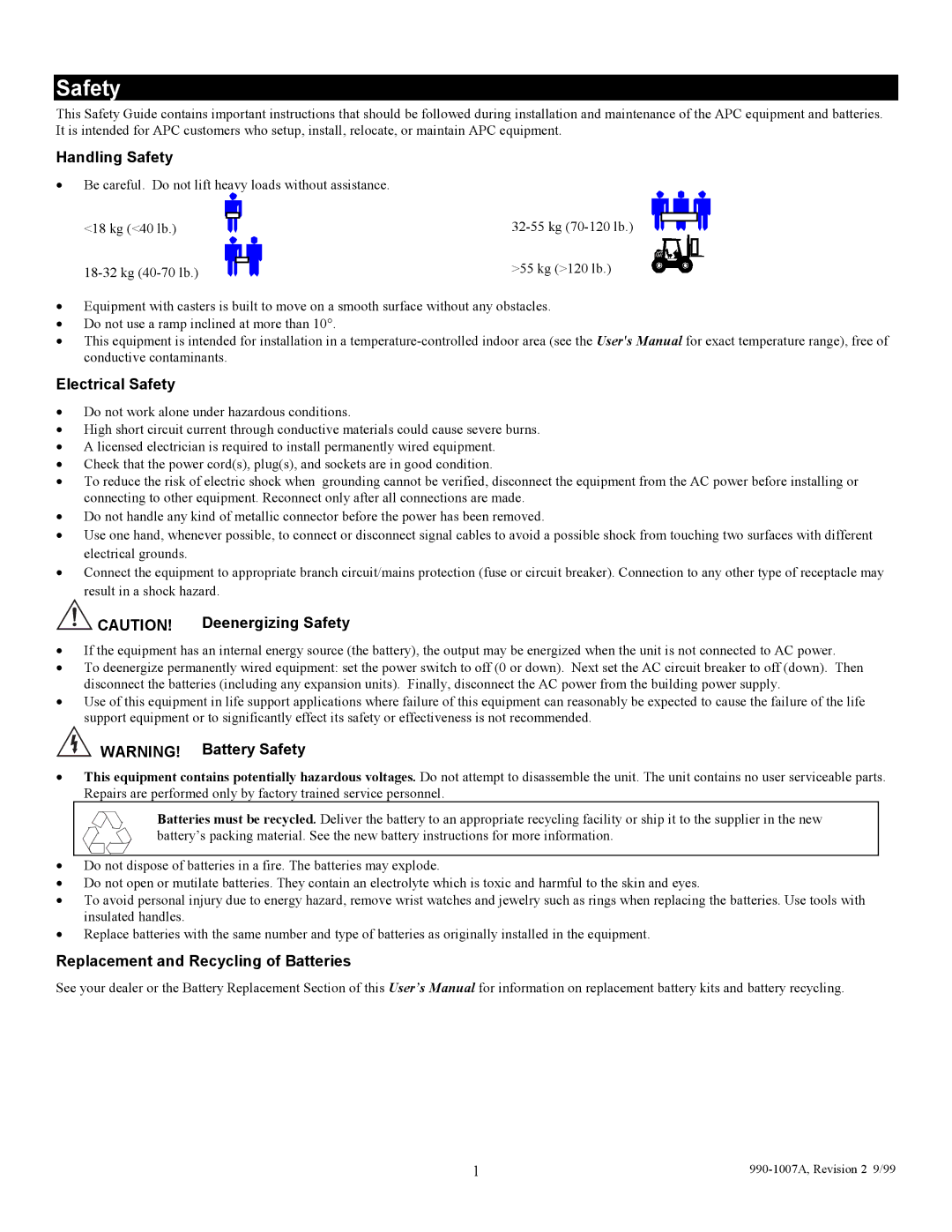
Safety
This Safety Guide contains important instructions that should be followed during installation and maintenance of the APC equipment and batteries. It is intended for APC customers who setup, install, relocate, or maintain APC equipment.
Handling Safety
•Be careful. Do not lift heavy loads without assistance.
<18 kg (<40 lb.) |
|
|
| |
|
|
| ||
|
|
| >55 kg (>120 lb.) | |
|
|
| ||
|
|
|
•Equipment with casters is built to move on a smooth surface without any obstacles.
•Do not use a ramp inclined at more than 10°.
•This equipment is intended for installation in a
Electrical Safety
•Do not work alone under hazardous conditions.
•High short circuit current through conductive materials could cause severe burns.
•A licensed electrician is required to install permanently wired equipment.
•Check that the power cord(s), plug(s), and sockets are in good condition.
•To reduce the risk of electric shock when grounding cannot be verified, disconnect the equipment from the AC power before installing or connecting to other equipment. Reconnect only after all connections are made.
•Do not handle any kind of metallic connector before the power has been removed.
•Use one hand, whenever possible, to connect or disconnect signal cables to avoid a possible shock from touching two surfaces with different electrical grounds.
•Connect the equipment to appropriate branch circuit/mains protection (fuse or circuit breaker). Connection to any other type of receptacle may result in a shock hazard.
CAUTION! Deenergizing Safety
•If the equipment has an internal energy source (the battery), the output may be energized when the unit is not connected to AC power.
•To deenergize permanently wired equipment: set the power switch to off (0 or down). Next set the AC circuit breaker to off (down). Then disconnect the batteries (including any expansion units). Finally, disconnect the AC power from the building power supply.
•Use of this equipment in life support applications where failure of this equipment can reasonably be expected to cause the failure of the life support equipment or to significantly effect its safety or effectiveness is not recommended.
•
•
•
•
•
WARNING! Battery Safety
This equipment contains potentially hazardous voltages. Do not attempt to disassemble the unit. The unit contains no user serviceable parts. Repairs are performed only by factory trained service personnel.
Batteries must be recycled. Deliver the battery to an appropriate recycling facility or ship it to the supplier in the new battery’s packing material. See the new battery instructions for more information.
Do not dispose of batteries in a fire. The batteries may explode.
Do not open or mutilate batteries. They contain an electrolyte which is toxic and harmful to the skin and eyes.
To avoid personal injury due to energy hazard, remove wrist watches and jewelry such as rings when replacing the batteries. Use tools with insulated handles.
Replace batteries with the same number and type of batteries as originally installed in the equipment.
Replacement and Recycling of Batteries
See your dealer or the Battery Replacement Section of this User’s Manual for information on replacement battery kits and battery recycling.
1 |
